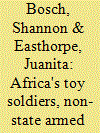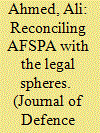| Srl | Item |
| 1 |
ID:
113320


|
|
|
|
|
| Publication |
2012.
|
| Summary/Abstract |
Armed conflict on the African continent has witnessed increasing recruitment of child soldiers, often at the hands of non-state armed groups. Unfortunately this practice continues unabated in the face of legal obligations prohibiting the recruitment of child soldiers under international humanitarian law, and international and regional human rights law. While international condemnation of the practice has led to attempts to increase the minimum age for recruitment to 18, a disjuncture persists between the legal obligations states sign up to, and the actual enforcement of these prohibitions at a domestic level.
International criminal law jurisprudence emanating from the Special Court for Sierra Leone and the International Criminal Court is being monitored closely, as these courts seek to enforce the prohibition in all armed conflicts, and against both state actors and non-state armed groups. International humanitarian law only protects child soldiers who have been unlawfully recruited. In this piece, the authors take a closer look at what amounts to unlawful recruitment in light of customary international humanitarian law, since this body of law also binds non-state actors, even without further criminalising legislation at a domestic level. Moreover, the article briefly explores whether a child can ever void this protected status by volunteering to participate directly in hostilities.
|
|
|
|
|
|
|
|
|
|
|
|
|
|
|
|
| 2 |
ID:
183412


|
|
|
|
|
| Summary/Abstract |
Russia’s official position regarding the prosecution for violations of
International Humanitarian Law (IHL) in international criminal courts
changed during the 1990s and the 2000s. The article studies the reasons
for these changes by reviewing works of Russian experts. The performance
of the International Criminal Tribunal for the former Yugoslavia (ICTY) had
a negative impact on Russia’s position. Russian experts questioned the
impartiality of the ICTY and its effectiveness in preventing such crimes and
reconciling the parties.
Russia’s position has also changed with regard to the International Criminal
Court (ICC). In 2000, the Russian Federation signed the Rome Statute that
established the ICC, but withdrew its signature in November 2016. One
of the reasons for that decision was the participation of Russian troops
in armed conflicts outside of the Russian Federation and outside of UN
peacekeeping missions. Russian experts emphasize that IHL norms are
enforced primarily at the national level, which means that Russia can make
its own decisions regarding criminal prosecution for IHL violations.
|
|
|
|
|
|
|
|
|
|
|
|
|
|
|
|
| 3 |
ID:
105463


|
|
|
|
|
| Publication |
2011.
|
| Summary/Abstract |
The present paper analyses and examines the Armed Forces Special Powers Act (AFSPA) in respect of legal aspects. It first discusses it in terms of domestic law, international humanitarian law (IHL) and human rights law. Given India's obligations under international human rights instruments going beyond domestic law is necessary in any such discussion. Ensuring complementarity between the Act in its application in armed conflicts and IHL, would contribute towards making the Act more 'humane'. The second part discusses the Act from security perspectives. In doing so, it reaffirms that respect for human rights and humanitarian law in countering insurgency is of strategic import. In conclusion,it makes some recommendations for the military which will enable it ensure that AFSPA and the IHL complement each other.
|
|
|
|
|
|
|
|
|
|
|
|
|
|
|
|